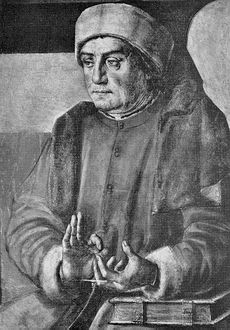The history of personalism is the story of how, over time, one has defined what a human being is. The personalist philosophy stretches its roots back to antiquity. Overall, the basis of personalism, the concept of person, developed in the clash between ancient Greek philosophy and the new Christian thinking in the first centuries after Christ.
The concept of person is, like much else, indebted to Aristotle. He stated that man is the only being with reason (logos). The animals are otherwise identical with humans, but they are áloga, irrational.

The word person is used by Tertullian (155-230) in the discussion of the doctrine of the Trinity and soon came to play a major role in the church’s development of the doctrine of Christ and the understanding of the Trinity in the 3rd and 4th centuries. It also gained importance for the thoughts of the human person. Theologians believed that when man was created in the image of God, the individual man must also reflect God’s personality traits – or at least have the potential to do so. To develop personality.
Roman law
In Roman law, the concept of person became a special category in the essential distinction between person and thing. The introduction of the concept coincided with changes in Roman culture and increased freedom in society. Everyone who could appear in court was a person, and this had an impact on their status in general.
When Roman law was given a personal structure, all people were considered free, except the slaves. The free man was person and had personality. As a natural consequence, a moral dimension emerged; every person was also independent, autonomous and responsible. Later developments have added a psychological dimension: the person is the mature human being.
The philosopher Boethius (480-525) was set by the King of Austria Theoderic (454-526) to define what a human being is. He came to the conclusion that: “Persona est rationalis naturae individua substantia” – a person is an individual substance of rational nature. This definition came to have great significance for any future discussion of what a human being is.
The first historical occurrence of the concept of personalism is found in the German philosopher and theologian Schleiermacher (1768-1834), who in 1799 used the term Personalism in the book Reden über die Religion. He emphasized the importance of the active personal, including the religious feeling.
Personalized schools
In the 1800s and 1900s, personalist schools are formed in different countries. Russia, France, Germany, Poland and the United States are countries that have a strong personalist tradition and develop personalist philosophy in play with and against other views of life such as socialism and liberalism. The main actors in this further development are listed in the menu on the left – divided into thinkers and practitioners, although some of them were largely both.
